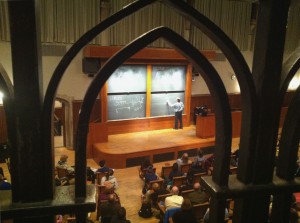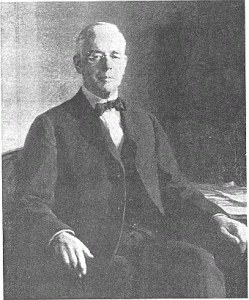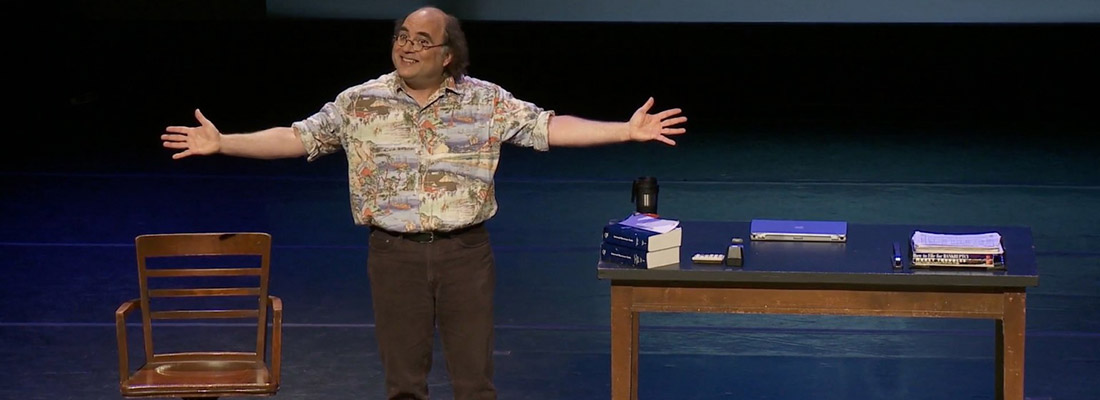
Last Thursday I had the remarkable, perplexing, and wistful experience of returning to Princeton University, my almost alma mater. The occasion was a performance of my monologue The Mathematics of Change, as part of the J. Edward Farnum Lecture Series (co-sponsored by the Princeton Math Dept.).
This was my first time back at Princeton since June of 1980, when I attended graduation ceremonies for my class, even though I hadn’t yet written my required senior thesis. Princeton lets you “walk” if you’ve done everything except your thesis; you just don’t get your actual degree until you do submit your thesis and it is accepted by your department. And amazingly, you can submit your thesis anytime in your whole life. What I was told, way back when, was that I’d get two grades: one for the submitted thesis, along with an “F” (for, I guess, being Way Friggin’ Late).
I did a monologue about not graduating from Princeton (oh, and also about democracy), titled Citizen Josh; incredibly, and excruciatingly, I am still working on my thesis! I’d intended that show to be my belated thesis, but the Princeton Politics Dept. told me that I needed to append some actual thesis-like prose to the Citizen Josh script. I’m now working on an abstract for that added section, with the benevolent guidance of a current Politics prof., whom I’ve never met but is almost certainly way younger than me, and definitely smarter.
In the meantime, now at least I’ve done my other Princeton monologue there: The Mathematics of Change, about when I “hit the wall” at freshman calculus. I’d been trying for years to do this show at Princeton, and finally made it based on the efforts of two brilliant Princeton mathematicians, Peter Sarnak (a bit older than me, I think) and Manjul Bhargava (unbelievably young). Somehow — perhaps using their number-theory wizardry to confuse the authorities — they arranged for me to perform the piece as a “lecture” in McCosh 50, the storied hall where Albert Einstein and many other luminaries once spoke.
It was, on the one hand, lovely to be at Princeton with my wife and our teenage son; back when I was a brooding, fumbling undergraduate, few (and certainly not I) would have predicted that such familial happiness lay ahead for me. It was, on the other hand, creepy to return to the scene of my academic crimes after 32 years and still feel like an outsider — someone who didn’t, and doesn’t, seem to fit in with the privileged vibe on campus, like a financially aided microbe that is being continually rejected by the host as a pathetic (and/or slightly dangerous) antibody. Or maybe it’s just that I should have studied harder, and that knowing this continues to bum me out.
In any case, it was totally lovely to do my math “lecture” in McCosh 50, before an audience of math faculty and students, along with anyone else who may have wandered in. (The event was free and open to the public.) It just goes to show that the route back into one’s past is sometimes made possible by the careful description of one’s abject failures. Or else it means that great mathematicians can make things happen for the rest of us — not the original definition of “applied mathematics,” perhaps, but it worked for me.

P.S.: One of the many silly comic riffs I go on in The Mathematics of Change has to do with the naming of Fine Hall, the math building at Princeton. In the show I speculate that, like many other buildings on campus, Fine Hall was named after a rich alum (presumably named Mr. Fine). I give this fictional guy a silly voice and silly things to say. … Well, it turns out that the real “Mr. Fine” was (a) not rich and (b) a beloved mathematician who, against great odds, managed to found a world-class math department at Princeton. Henry Burchard Fine was born in 1858 (a bit more than a century before me) and died in 1928 (a year after my mother was born), after being hit by a car while riding his bike on the outskirts of Princeton (cycling being something he loved to do, as I love to do it now). I was gently informed of these facts by several mathematicians who had been in my audience in McCosh 50 — and have supplemented them by reading a fond obituary by a friend and colleague of his. My friend Cynthia Dwork — a great mathematician herself — happily recalled her mathematician father’s office in the original Fine Hall, which was beautiful and grand (unlike the somewhat boxy structure that bears his name today). … This all lends further ammunition to the argument that one should never trust an autobiographical monologuist! (I certainly don’t.)
P.P.S.: Right after my “lecture,” I was interviewed by a reporter for the Daily Princetonian. His report can be read here.
